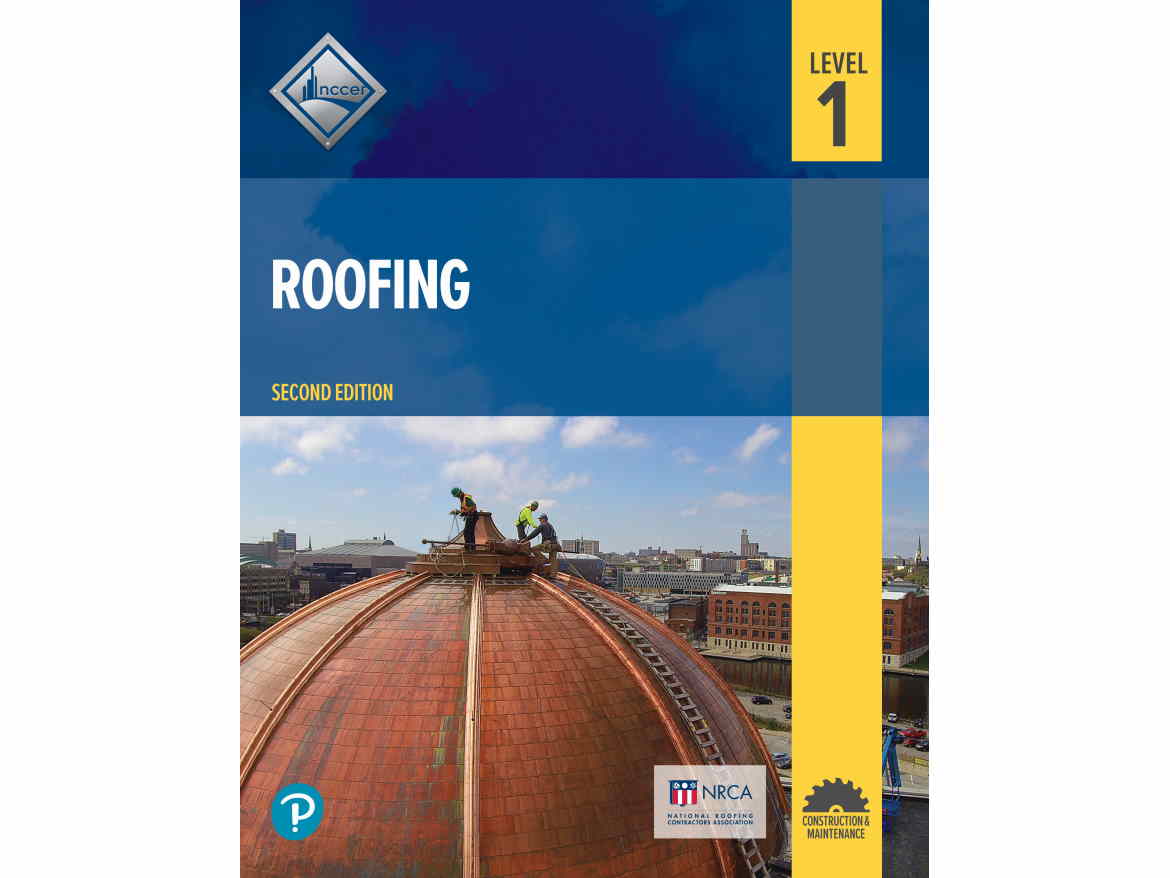
Image courtesy of the NCCER.
ALACHUA, Fla. — The National Center for Construction Education & Research (NCCER) recently released new curricula for roofing that meets standards for time-based apprenticeship and emphasizes safety and fall prevention.
Consisting of two levels, the second edition of Roofing was written in partnership with the National Roofing Contractors Association (NRCA) and meets the Department of Labor’s standards for a time-based apprenticeship program. New Steep-Slope Roofer and Low-Slope Roofer interim credentials provide additional specialized career paths. Level 1 is currently available with Roofing Level 2 coming early 2022.
In addition, this curriculum was updated with steep-slope and low-slope roofing systems, safety, drawings, substrates and specific training including asphalt shingles and liquid-applied systems. Two detailed modules, “Roofing Safety” (16202) and “Fall Protection Orientation” (75901), teach safety practices being used today.
A team of subject matter experts, representing both industry and academia, contributed to the development of the training curricula to ensure they meet or exceed industry standards. For the Roofing curriculum, NCCER worked with the following: Advanced Roofing; The Arizona Roofer; Deer Park Roofing; Don Kennedy Roofing; Eagle Roofing; Florida Roof; GAF; Garlock-French; Mid-South Roof Systems; NRCA; Nations Roof; West Roofing Systems; and, PDM Architects.
NCCER develops and distributes its curricula in partnership with the world’s leading learning company, Pearson, and ensures that it complies with the Department of Labor’s Office of Apprenticeship requirements for time-based training. Individuals who successfully complete these training programs through an NCCER Accredited Training Sponsor will earn industry-recognized credentials through the NCCER Registry System.
Electronic Systems and Hazards
In addition to roofing, the NCCER released curricula for Electronic Systems Technician and Managing Electrical Hazards. With Roofing and Electronic Systems Technician providing additional interim credentials, individuals can pursue multiple, distinct career paths.
After taking Electrical Levels 1 – 2, trainees can choose a limited-energy career path by completing levels 3 - 4 of Electronic Systems Technician. This curriculum has been revised with updated National Fire Protection Association (NFPA) codes and standards to include the 2020 National Electrical Code® and 2019 National Fire Alarm and Signaling Code®. New information about the Power over Ethernet and Power over Fiber has been added, as well as Internet of Things topics. Interim credentials include Audio, Video and Data and Life Safety and Security.
The fifth edition of Managing Electrical Hazards has been updated to the 2021 edition of NFPA 70E: Standard for Electrical Safety in the Workplace. Frequently used as continuing education for electricians, this module includes coverage of new absence of voltage tester technology.
The authoring committee responsible for making these changes included subject matter experts with representatives from the following:
- Electronic Systems Technician — Associated Builders and Contractors (ABC); Bay Alarm Company; Connect-Max, LLC; DISH Network, LLC; Ring, LLC; and, Tera-Byte Technologies.
- Managing Electrical Hazards — ABC of Carolinas; ABC of Iowa; Beacon Electrical Contractors; Cianbro Corporation; Elm Electric; Gaylor Electric, Inc.; Gould Construction Institute; Intertek; Madison Comprehensive High School; National Field Services; Panduit; Quality Electric; Starr Electric; TIC – The Industrial Company; Tri-City Electrical Contractors; as well as John Mueller, an independent contributor.
To learn more about NCCER curricula and purchasing options, visit www.nccer.org/curricula.


